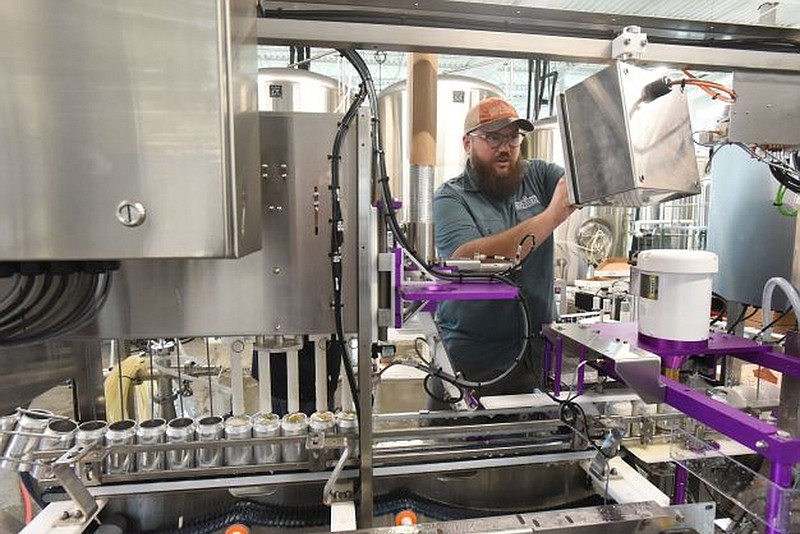BENTONVILLE -- Beer bottles are going on the back burner at Bentonville Brewing Company as the craft beer-maker fires up its first canning line.
Owner and Chief Operating Officer Katie Boykin said the initial test runs of the brewer's new Twin Monkeys canning line were successful and in the coming weeks Bentonville Brewing's product will be seen in cans for the first time in Northwest Arkansas. Over the past few years, the company's products have been available in only bottles and kegs.
"It's been pretty exciting," Boykin said of opening the canning line. "It's so much faster than the bottler."
Bentonville Brewing will be offering several of its signature brews in cans over the coming weeks including its Soulshine Kolcsh, Lil' Wrecker IPA and Space Goose Hazy IPA.
It's Festbier, Homewrecker IPA and Natural State Porter will follow in cans shortly thereafter. The bottling line won't be totally mothballed and will be used for specialty offerings in the future.
The canning line made up a capital investment of about $155,000, Boykin said adding the company went for bottles initially because the cost of entry wasn't as steep and it was more affordable in the short term.
"The price was right," she said of the company's first bottling line. "And it helped us get through the pandemic."
Bentonville Brewing Co. started out in 2015 in it's namesake city but soon ran out of space and moved its operation to nearby Rogers in 2017. In mid-December of 2018, Bentonville Brewing broke ground on its new location at 901 S.W. 14th St. in Bentonville and started serving customers there in April 2020 right in the teeth of the covid-19 outbreak.
Its new home, which the company leases but was built-to-suit, includes a taproom, beirgarten, dog park, playground, food trucks and greatly enhanced production capacity to an annual capacity of 8,000 to 10,000 barrels. A barrel of beer equals 31 gallons.
Bentonville Brewing self-distributes its products in Benton, Washington and Carroll counties via a team of five employees and works with a distributor to get its beer to the Fort Smith market.
"Growth is the long term plan but we don't need to set the world on fire. We want to go deep close to home," Boykin said.
Revenue for the craft beer segment nationally is projected to sit at $7.27 billion for 2021, up from $6.97 billion in 2021, the lowest annual revenue since 2017, according to an April report produced by market research firm IBIS World. Revenue for 2019 -- the year before the covid 19 pandemic shuttered for months the tap rooms and restaurants and bars that buy kegs of beer -- was a record for the industry at $7.54 billion.
Sales growth projections for the next five years are steady but lower than the previous five years, according to the report which anticipates yearly growth of 2.4% between now and 2026, to revenue of $8.2 billion.
Bart Watson, chief economist for the Brewers Association, a trade group for craft brewers from across the United States, said many craft brewers have shifted to bottles in recent years. He said in 2015 more than 80% of package beer sold by craft breweries was offered in bottles but today more than 50% of package sales were in cans.
Based on year-to-date data, Watson said cans have a 61% share of package sales by independent craft brewers by volume based on data from IRI Group. That's up from 56% share in 2020 and 49% in 2019 for the same period.
Watson said the shift from bottles to cans came due to a variety of factors, including price and convenience for both consumers and brewers but it also came with a change in perception by consumers. He said for years many associated craft beer with bottles but that "perception gap" has narrowed over the years.
Bentonville Brewing's Boykin said switching primarily to cans has a lot of advantages. Boykin notes cans are more versatile, allowing for sales in places like golf courses, ball parks and concert venues that don't allow glass bottles.
They're also more portable for camping or hiking excursions. Beer in cans also has a better shelf life and are typically a little easier to recycle in some Northwest Arkansas cities including Bentonville.
From a business perspective, cans are easier to stack, so they're easier to ship and take up less space on retail shelves. Boykin added even with the rising cost of aluminum and occasional scarcity of cans, they're still a bit more affordable than bottles.
Head brewer Beau Boykin said the Three Monkey's canning line with its five filler heads spits out about 50 cans of beer a minute, compared with about 20 bottles of beer under the old bottling system. He said the new canning system can be upgraded to double its output as the brewery grows.
Arkansas has 51 operating breweries, some of which operate more than one taproom, with 47 of those beer makers members of the Arkansas Brewers Guild trade group, according to Sylvia Blain, executive director of the guild. Two brewers, Wicked Head in Trumann and Social Project in Bentonville, are expected to open in the near future.
Arkansas producers brewed 16% more beer in 2019 than in the year before, according to information provided by the Alcoholic Beverage Control Division in November. The state's brewers reported production of 40,818 barrels of suds in 2019, up from 35,193 barrels in 2018.
Lost Forty Brewery in Little Rock was the state's largest beer producer, making 14,238 barrels in 2019, down slightly from the previous year. The company's production made up nearly 35% of the state's total.
